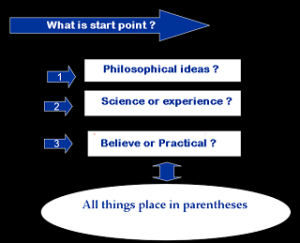
Arquivo para August, 2017
The emptiness and the epoché in Husserl
If there is any similarity between the Husserlian epoché and the methodical doubt of Descartes, it is simple appearance, for the epoché (put in brackets) served for Husserl to enter the core of the appearances of things to consciousness.
Descartes, it is simple appearance, for the epoché (put in brackets) served for Husserl to enter the core of the appearances of things to consciousness.
Thus this supposed resemblance between the two philosophers does not authorize it to mean that the epoché, in putting the world aside, doubts the existence of things, and this doubt will lead to idealism, with the critique of “pure” Reason of Kant and others That there will come a dualism between the objective and subjective worlds.
With Husserl’s epoché one does not properly pretend to doubt the existence of the world and its objects, much less to reject the intuition we have to know it, reducing consciousness to some kind of transcendence.
The world will be anchored only in the aspect as it presents itself in consciousness “eeduced to consciousness”, as we have already argued here, Husserl’s phenomenological method promotes a revision in the Cartesian cogito.
The Husserlian method of phenomenological reduction brings with it other notions that must be presented here: the transcendent and the transcendental, being the transcendent, the consciousness as Husserl sees it, is the everyday and habitual perception we have of the things of the world, not a chair But this chair, this tree, this book, so the transcendental “is the perception that consciousness has of itself” (Brazilian Philosohpy dictionary ABBAGNANO, 2000, p. 973).
One can then say that “the transcendent is the outer world” while the transcendental “is the inner world” of consciousness (HUSSERL, 2008, p.18), thus redefined the notions of noema and noesis, since they existed in antiquity .
This emptiness to apprehend the object, since it happens in ‘pure consciousness’ or ‘transcendental’, it is the experiences entirely lose their psychological and existential character to preserve only the pure relation of the fully purified subject to the object as conscious, and this is To uncover, to know.
There is a distinction between the perceived object and the noema: “the noema is distinct from the object itself, which is the thing, eg the object of the tree’s perception is the tree, but the noema of that perception is the complex of predicates And ways of being given by experience. ” (Brazilian Philosohpy dictionary ABBAGNANO, 2000, p.724).
To what extent this experience can be “transcendental” is the ultimate question.
Aspects of phenomenology
Both the so-called “pure” sciences and other experimental sciences depart from empirical data or “practical” hypotheses to develop their postulates, Husserl warned that the instability of empirical data as well as much of the theoretical postulates do not provide the necessary rigor as regards To philosophical inquiry.
from empirical data or “practical” hypotheses to develop their postulates, Husserl warned that the instability of empirical data as well as much of the theoretical postulates do not provide the necessary rigor as regards To philosophical inquiry.
In essential aspects, positivist science or its field of analysis to the experimental, or considers as “phenomenon” regions that are veiled by some methodological rigor limiting a general analysis more comprehensive and not explanatory of certain phenomena.
What Husserl understood as a “comprehensive analysis” is that which refers to consciousness and this in turn is based on experiences (Erlebnis) of the world occur in and through consciousness, henceforth its postulate “all consciousness is consciousness of something”.
It is in this perspective that Husserl takes from his master Franz Brentano his most essential category of intentionality, so intention is a general characteristic of this consciousness.
This is the first point in the analysis of the phenomenon, so different from the Cartesian cogito which gains a new meaning from the intentionality (the consciousness of something) that, contrary to being “clear and distinct” as Descartes wanted, is directed (intends) to something.
In addition to the intentionality Husserl considers intuition and apodic evidence, being the intention of an object (the example is a book on the table), there being the “meaningful content” (Bedeutungsintention) of something, then “we mean intentionally” (meinen) some Object, without even considering its presence,
Intuition is then the fulfillment of an intention, then it may consider “evidence” to be the consciousness of intention, therefore it is intuitive but insofar as there is a “consciousness of the phenomenon”, and in this sense it is apodictic, ie it is self-evident , there is no need for empirical evidence.
A last aspect is the hylé, the “subjective matter” that composes any perception, although there are the “hiletic data” that would be “constituted by the sensible contents, which comprise, besides the external sensations, also the feelings, impulses, etc. ” (ABBAGNANO dictionary, 2000, page 499). Are not only the “matter” upon which consciousness is given, and are not empirical.
Then appears the Husserlian epoché, which is the parenthesis, we will explore later.
The importance of Husserl’s phenomenology
The importance of Husserl’s phenomenology is that he performed at one stroke the criticism of psychologism, through his most advanced post of his master Franz Brentano, to the characteristic relativism of our time and modernity and to historicism in a work little known to JF Lyotard) he stressed: “the Cartesian hope of a Mathesis universalis is reborn in Husserl” (1957: 6), although Lyotard later criticizes it.
the criticism of psychologism, through his most advanced post of his master Franz Brentano, to the characteristic relativism of our time and modernity and to historicism in a work little known to JF Lyotard) he stressed: “the Cartesian hope of a Mathesis universalis is reborn in Husserl” (1957: 6), although Lyotard later criticizes it.
The theme of epoché is not to return to a return to the classical theme of antiquity, but to what he called the “thesis of a presupposition: man is immersed in a kind of general ‘, ie an implicit understanding of the world; The world is then essentially familiar to man, and it is within this naturality that one intends to say what it is to know the real:
“I am aware of a world that extends endlessly in space, which has an endless development in time … I discover [the world] by an immediate intuition, I have experience of it” (1991: 37).
He understands by a natural attitude, that which does not cease “to realize the world as ontologically valid … My life in all its acts is part oriented to the being that belongs to that world, … are interests by things of the The world, being realized in acts concerning these things, as long as they are correlate of my intention. “(1989, 519).
So it is about this “being in the world” (Husserl was a pupil of Heidegger and his expression is earlier), it is a Selbstverständlichkeit, and this can not be doubted, then how is his epoché realized? Is to become skeptical and like this as abstention from the inconstancy in the “spectacle of the world,” or what Husserl defined as “distance from naive natural validations” (Husserl, 1989, 154), but clarifies that it is not the “Criticism of knowledge”.
The consciousness of the natural environment as an “existing reality” (perhaps perhaps Heidegger took his Dasein), but he questions the duration of this attitude: “It is something that persists as long as the attitude lasts, that is, as much as the life of consciousness Vigilante follows its natural course “(Husserl, 1991, p.96).
What is important and this is in his booklet Cartesian Meditations, it is not a question of establishing a “universal doubt” because it does not put the being in doubt, but only its attributes, so assumes universalist tensions, and now it is the phenomenology that can, with propriety , To be conceived as transcendental, since it allows for epoché a “total alteration of the natural attitude of life” (Husserl, 1989, 168), putting objectivity as such in check.
The epoché is then “a certain suspension of the insurrection which is compounded by a persuasion of the truth that remains unshaken” (Husserl 1991: 100).
When we operate this original epoch, Lyotard’s study of phenomenology in 1956 also pointed this out, shows the insufficiency that Descartes’s radical procedure as a doubt had limitations, as Husserl says:
“Since every thesis or judgment can be modified with full freedom, and that every object on which judgment is referred can be put in parentheses, there would remain no room for unmodified judgments, let alone for a science.” Husserl, 1989, p.102).
HUSSERL, E. The crisis des sciences européennes et la phénoménologie transcedentale. Trad. G. Large. Paris: Gallimard, 1989.
HUSSERL, E. Idées directrices pour une phénoménologie. Trad. Paul Ricoeur. Paris> Gallimard, 1991.

